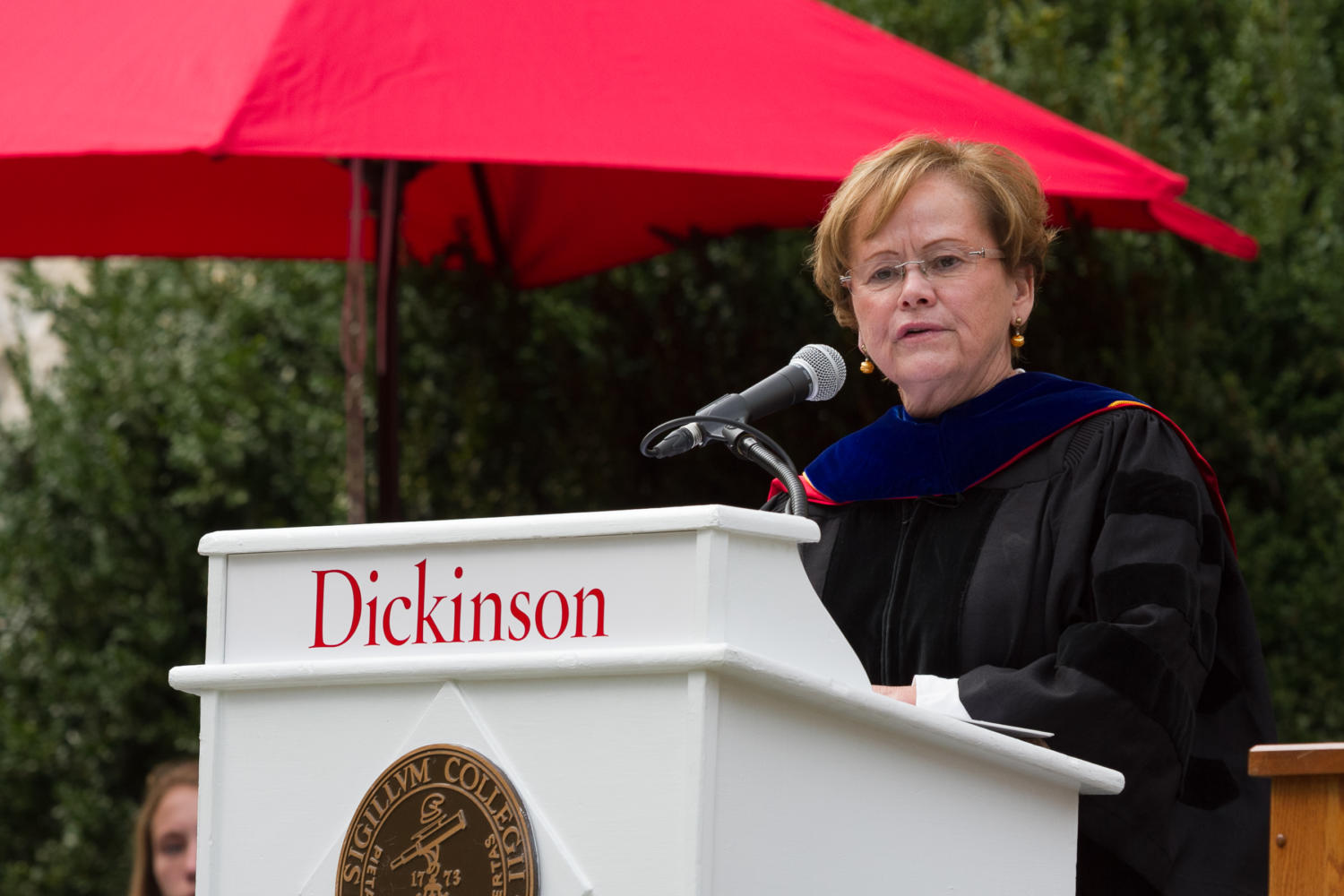Ensign Steers Dickinson “Out Of Comfort Zone”
2017 has marked the beginning of a new era at Dickinson. With the election of a new president, Dr. Margee Ensign, the college has also begun to push in a new direction introducing strong initiatives in inclusivity, intercultural understanding, and global perspective as well as continuing the tradition of sustainability. President Ensign released a draft of Dickinson’s new vision statement to the community via email early August.
“It’s an initial document to get people thinking…I released it at a retreat that we held this summer that was not just with senior staff but with a group of faculty and there was a student there in the afternoon,” said Ensign on the topic of how much tweaking remains to be done to the document. “[T]he staff and faculty first reviewed it in the retreat this summer and analyzed it and discussed it and came back with ideas to change it, so it changed based on that and then as you know if was release to the entire community, which you know I really believe in, whatever we end up with it’s got to be something that we can support and are excited about and so it’s gone out to faculty, students, staff and alums, and the board, so everyone has it, everyone is reviewing it and comments are still coming back in,” she continued. Ensign plans to take comments and suggestions from the community until the end of the month at which point she will take the document to the new strategic planning committee, which is currently in the process of being formed. “[The draft] wasn’t released [as a] ‘This is it.” A lot of people have some very good ideas and suggestions and so that’s where we’re headed with that,” Ensign said.
“[Dickinson has] had several visions [in the past] that have been turned into strategic plans and then last year’s was kind of in between: it wasn’t a strategic plan but it was a set of concepts to look at going forward,” said Ensign, who hopes to expand Dickinson’s global programs and intensify the campus’s intercultural understanding. “Dickinson’s had a long history of pioneering and innovating in international education, so certainly that’s in the vision statement that was just released; strengthening it in some ways, going to new places in the world, and making sure your generation is really prepared for a fundamentally different world from when the first strategic plan was done.”
Ensign draws on her experiences as the president of the American University of Nigeria to influence her vision for Dickinson: “[O]ne of the things that is emphasized more there is the civic engagement, the theme of useful education for the common good, it’s something I learned powerfully out in northeast Nigeria that can fundamentally change much about an education and I believe the times that we live in demand that we do more of that.” Ensign feels that this can be largely accomplished by expanding the range of study abroad programs available to Dickinson students. “I’m a big believer in getting students outside of their comfort zone,” she emphasizes, “and I think it’s critically important we have a trained generation that understands both the progress and the challenges in Africa, in Latin America, all over Asia. Traditionally, study abroad programs are in Europe, and that’s wonderful, but I believe that much of the, again, challenges and progress are coming from other regions and so I think a well-rounded program with many, many options in the newly emerging countries are important and as I said, for me, the purpose of study abroad is of course to live in a new place and I think that if you’re in a place that’s quite different from the culture you’ve lived in, not that European cultures aren’t different, but you’ve become more challenged, learned more, and maybe even become more independent.”
“I think it’s critically important that we prepare students for a future that may be unknown and that they really have both the academic experiences but also the emotional experiences to prepare them to be self-reliant and to be those open-ended thinkers that we know we need,” says Ensign of the benefits of study abroad.
Another aspect of this draft of Dickinson’s new vision statement is to “build on the unique strengths of a residential college to deepen our commitment to understanding and working with different sorts of people by initiating an all-campus intercultural competency program,” as phrased in the draft itself.
Among these broader issues of global perspective and intercultural competency, Ensign hopes to make internships more accessible for all students as well as making Dickinson’s tuition more affordable for American students. Ensign remarked upon “the importance of internships,” saying explicitly that “we’ll want to make sure that all students have that opportunity, especially some of our students who don’t have as many resources as others. I met some this summer when I was in Washington and they said, ‘We’d love to be doing [an internship], but we have to be working full time,” so I think we can come up with some new models to make sure there’s something available for every student that gives [them] a real chance to test out career goals.”
“It’s really a joint undertaking with the college,” summarized Ensign. “[I’m working with] faculty, students, staff, alum, and the board…as you set a new direction for an institution, boards are generally pretty involved in that.”






